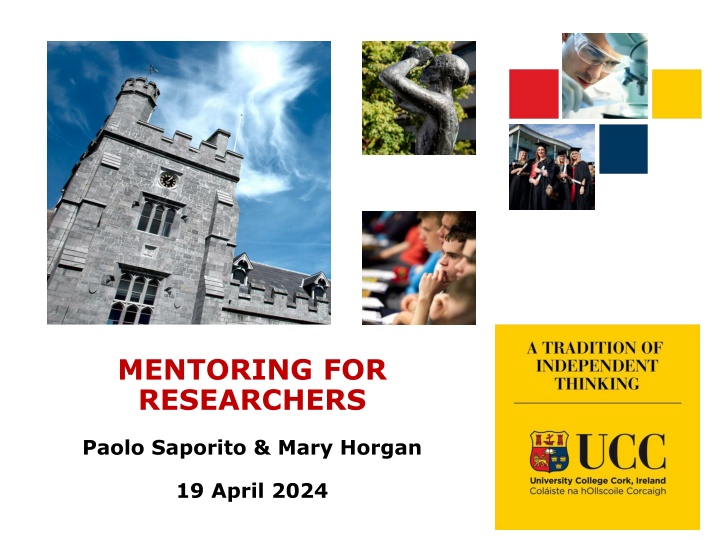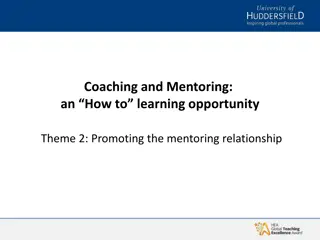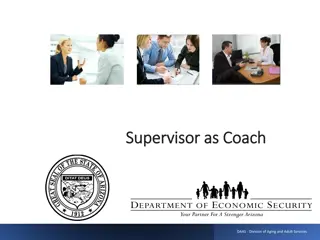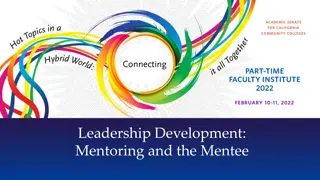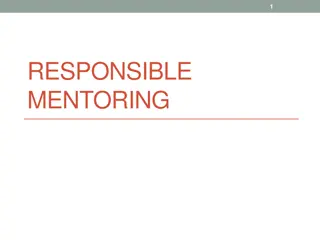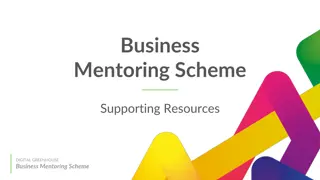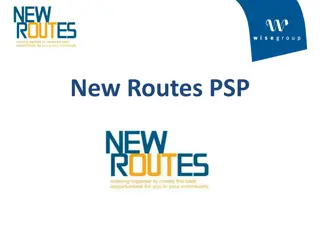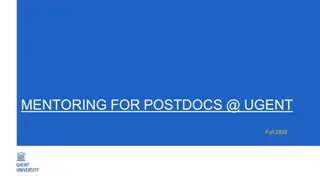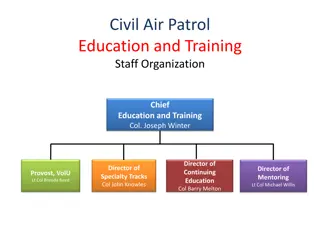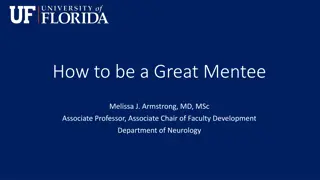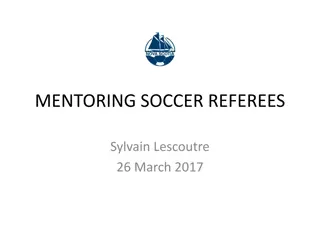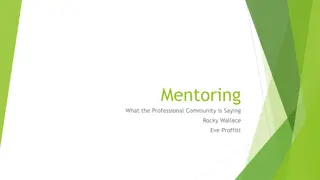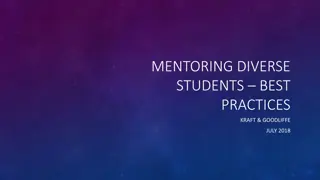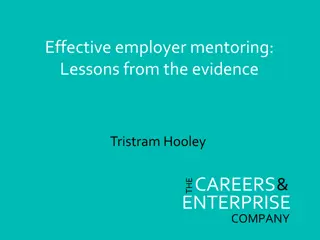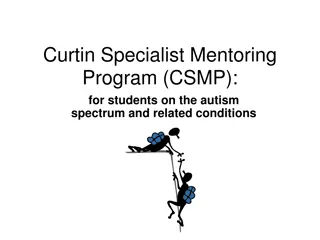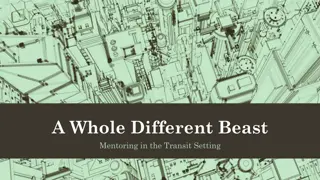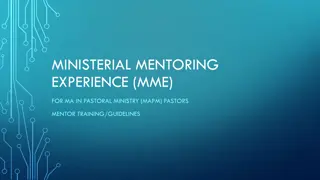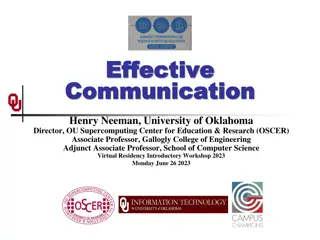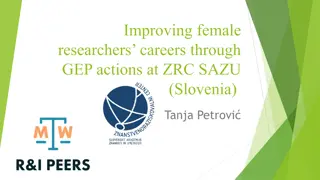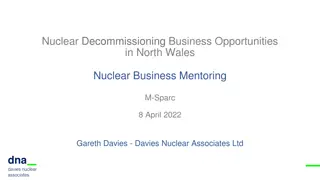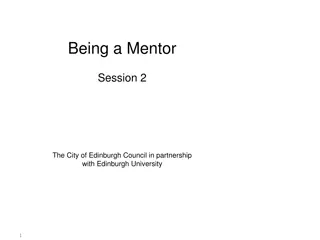Effective Mentoring for Researchers
In this session, Paolo Saporito & Mary Horgan will delve into the essence of mentoring, its benefits, and how it can elevate your research career. Understand the roles, principles, and expectations involved in mentor-mentee relationships to maximize your potential in academia.
Download Presentation

Please find below an Image/Link to download the presentation.
The content on the website is provided AS IS for your information and personal use only. It may not be sold, licensed, or shared on other websites without obtaining consent from the author.If you encounter any issues during the download, it is possible that the publisher has removed the file from their server.
You are allowed to download the files provided on this website for personal or commercial use, subject to the condition that they are used lawfully. All files are the property of their respective owners.
The content on the website is provided AS IS for your information and personal use only. It may not be sold, licensed, or shared on other websites without obtaining consent from the author.
E N D
Presentation Transcript
MENTORING FOR RESEARCHERS Paolo Saporito & Mary Horgan 19 April 2024
Lets get the most out of this morning Email: Switch it off & be present Microphone: When not speaking, please keep it on mute Camera: If possible, do have your camera on Participate: Just use the raise hand function if you have a question or wish to comment & click to take it down afterwards. The more interactive, the better! Confidentiality: Everything we discuss is confidential
Briefing Objectives Part 1 Clarify what mentoring is Examine purpose & benefits of mentoring Review roles of mentee & mentor Confidentiality Part 2 Examine how working with a mentor can support you to navigate and advance your research career Consider your personal objectives for mentoring, and the type of mentor you want to work with Describe the characteristics of an effective mentor, and good mentoring practice
What does mentoring mean to you? Structured process where experienced individual (mentor) helps another person (mentee) to develop his/her goals & skills through time limited, confidential one to one conversations Supportive relationship - role of the mentor to help, advise & provide information & guidance to mentee. May work in similar areas or share similar experiences Relationship based upon mutual trust & respect No line management relationship between mentee & mentor
Principles Mentee led Goal oriented (concrete goals) Environment of openness, trust & mutual support Both parties respectful of each other s time, experience & difference Partnership approach No hidden agendas & non judgemental Confidential process
Mentoring vs. Training Directive - focussed on meeting set learning outcomes and skills gaps Training Directive guidance & advice based on experience Mentoring
Expectations Mentors: Expectations of your mentee Mentees: Expectations of your mentor
Role of Mentee Actively engage with mentoring process & appointed mentor Drive the process - take responsibility for managing mentoring relationship including meeting commitments, arranging meetings etc. Set clear objectives and goals & realistic expectations around delivering on development needs Communicate directly, honestly & openly, be curious, pose questions, share ideas Be willing to listen & take on board constructive feedback & advice Retain responsibility for own learning
Role of Mentor Provide guidance & support in addressing identified development needs Act as sounding board, providing encouragement & source of knowledge, stimulating insight Create new perspectives & different ways of thinking A figure with whom mentees can discuss their aspirations and concerns; who will listen; provide constructive feedback, challenge as appropriate See positives in mentee that they may be unaware of Support & encourage mentee to take positive action Help mentee to understand how things operate in UCC including the unspoken norms & values Introduce mentee to peers & colleagues as relevant to assist them become familiar with & integrate into the wider University Mentor has no responsibility for actions & decisions of mentee
Confidentiality What does confidentiality mean to you and your mentor/mentee? In what circumstances would confidentiality need to be broken and how would this happen?
1stMeeting - Some suggestions Coffee & Chemistry & then .. Getting to know each other Discuss & clarify expectations & goals Boundaries what is in & out Confidentiality In between contact? Post meeting follow up? Mentee led process
Mentoring and Research Mentoring conversations are not limited to a mentoring programme and can take place with a range of supporting players, and in a range of different ways Everybody needs a Mentor but its horses for courses (= what is suitable for one person or situation might be unsuitable for another)
Mentoring and Research Informal mentoring PI or Supervisor (back in a minute) Peer networks and communities - Insights into research careers - Updates on discipline developments in institutions relevant to your research area - Support, critical feedback - Also available through professional bodies and societies Institutional mentor - Norms or working cultures within your department/school/college/university - Awareness of key contacts (i.e. HR, Finance, Research Office) - Usually pairing managed by institution - Confidential space if outside of own department
Mentoring and Research Informal mentoring Research Career Development Professionals (i.e. HR Research, Careers Services) - Support in career and skill development - Directions to relevant training (including FORMAL mentoring programmes) - Knowledge of your rights, roles and responsibilities as a researcher (employment/contract side) Research Officers - Guidance and feedback on funding strategies - Knowledge of your rights, roles and responsibilities as a researcher (research side) - Fit/eligibility for funding calls
Mentoring and Research Informal mentoring Sponsors - Specific role in career development career advocate acting on your behalf - Use their reputation to help you - Give you access to opportunities and resources
Mentoring and Research Informal mentoring Sponsors (examples) - Link to research fellowships (i.e. John Smith Foundation, charitable organisations) - Talent Development Programmes - Prestigious PI in your field
Mentoring and Research Career Gains Increased confidence and self-awareness Knowledge of role responsibilities and future career options Setting goals Contacts with networks Organisational tools and techniques Publication plans Work/life balance strategies Improved workplace relationships
Mentoring and Supervision The Supervisor/PI as an informal mentor Pros: Professional advice Access to career opportunities (i.e. funding) Advice on skill and idea development Cons: Hierarchical relationship (i.e. line manager) Stakeholder in your research progress and success = guidance influenced by their interest
Mentoring and Supervision Supervising and mentoring are two different practices. Supervision (or line management) It is a legal requirement It involves directing actions and overseeing tasks Setting KPIs, assessing, evaluating Goal: accomplish organizational or educational objectives Outcomes are required, not necessarily desired Mentoring It is a voluntary, mentee-led initiative No assessment or evaluation, only constructive feedback Goal: discuss objectives set by the mentee Outcomes are desired and willingly pursued, not required
Mentoring and Supervision Vitae Researcher Development Framework
Mentoring and Supervision Vitae Researcher Development Framework Phase 2
Mentoring and Supervision Vitae Researcher Development Framework Phase 3, 4 and 5
Over to you. 1. Are you interested in having a mentor? What goals/objectives would you like a mentor to offer support & guidance on? Have you a mentor in mind? 2. Interested in being a mentor to a researcher? Brief outline of your experience & areas you could assist with. Contact marykate.oregan@ucc.ie or maryniamh.horgan@ucc.ie to progress or discuss further.
